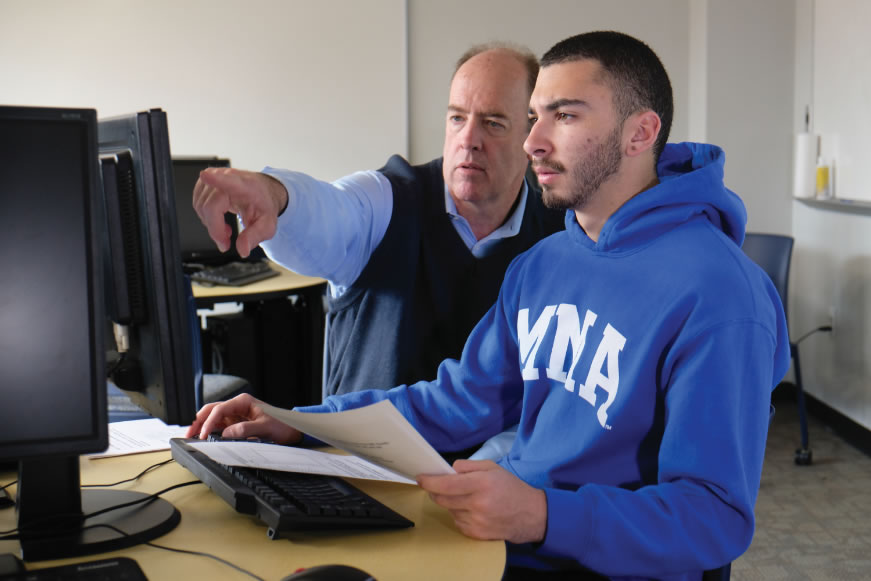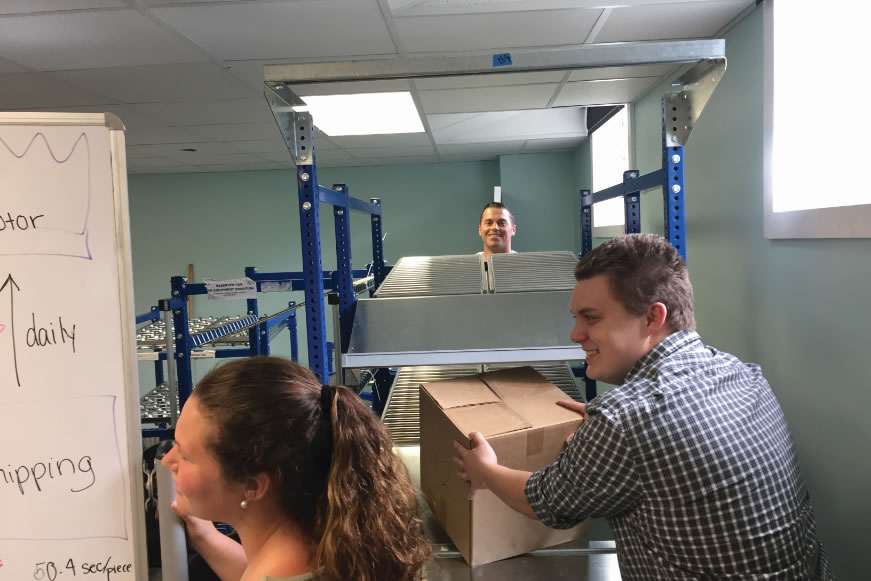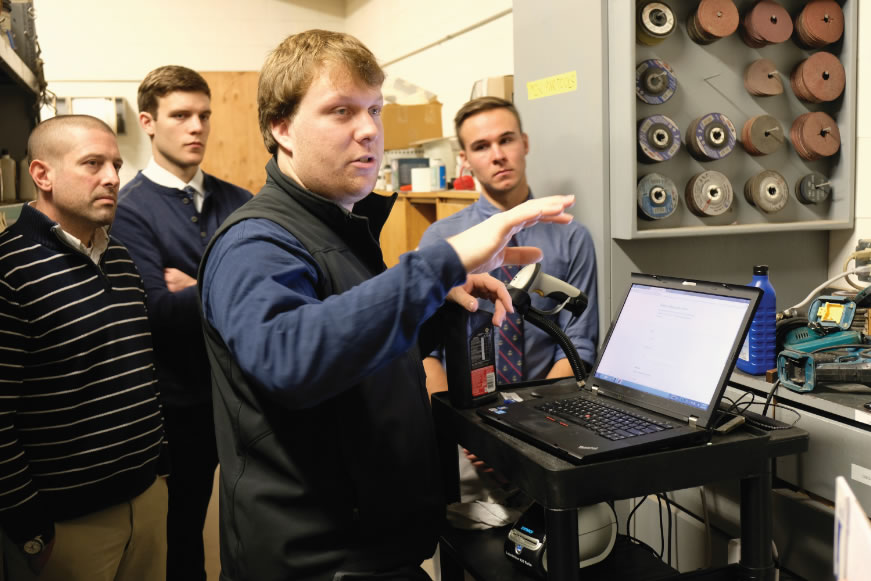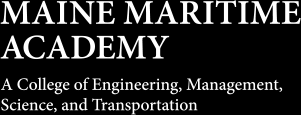In 2014, graduate students completing their strategic capstone project with Professors Mark Shaughnessy, George Schatz, and Dr. Donald Maier in the Loeb-Sullivan School (LSS) of International Business and Logistics, drafted an extensive strategic plan for Bangor International Airport (BGR) to build out as a hub for freight transportation.
“Bangor International is primarily a passenger airport, but BGR management and our faculty felt it had a possibility of becoming a freight airport as well,” says Shaughnessy.
The students performed extensive research and presented a plan on how to implement freight operations at BGR. The airport is uniquely located because it’s closer to Europe than any other in the nation, and has less air congestion.
In the process, they discovered the Anchorage, Alaska airport is situated similarly to Bangor— the closest airport in the United States to Asia—and has become one of the busiest freight hubs in North America because of that proximity.
The students looked at what made that work and proposed ways for BGR to take advantage of its location. Because it was a strategic air command military airport, the students de termined the infrastructure—hangars, tarmac and storage facilities—was there to handle freight.
“To get the freight flowing,” says Shaughnessy, “our students developed a marketing plan to talk to freight carriers and users across Europe and Asia, and they illustrated the economic benefits for carriers who use Bangor versus flying to Boston or elsewhere on the East Coast.”
This planning process was no pie-in-the-sky exercise. The students presented their plan to BGR’s management and political leaders, and it’s now being used as a development blueprint. Real-world, participatory work sums up the nature of LSS programs. The undergraduate degree program, now in its 20th year, provides a broad business education with an international emphasis and focus on logistics, a profession that provides the links within and between companies as they create and move products in the global economy.
Students in the graduate program, now in its 30th year, develop leadership skills through specialized courses that deal with the challenges of logistics in domestic and global supply chains. With similar curriculum, the school’s online graduate program allows working professionals to further their careers in the field. (For more information, email info.ls@mma.edu.)
The school, which has summer co-ops, business internship opportunities and longstanding relationships with industry, fulfills its mission of instilling confidence, competence and professionalism, thus preparing students for jobs immediately upon graduation.

Assistant Professor Kirk Langford guides Sergio Irrizarry in working with MercuryGate, a widely used multimodal TMS (Transportation Management System).
What is logistics?
“Nothing moves without logistics,” says Donald Maier, the school’s dean since 2011. “Other MMA programs teach how to manage and move a ship. We look at the last mile, as we refer to it. Once freight comes off the ship, logistics makes sure the customers receive their goods on time. We look at the process from beginning to end, from raw materials to finished goods, to the customer.”
Maier offers an example: “Where does a pencil come from? Everyone says, ‘China.’ But it [typically] comes from different companies around the world. The eraser might come from South Korea, the tin from China, the lead from the U.S., and the wood from somewhere else, and it’s all assembled in Mexico and then distributed from the U.S. That’s just a simple pencil.”
“Now, look at a product like a Boeing aircraft. Boeing is able to produce 52 aircraft (of its 737 produced annually) in one month. Imagine supplying that kind of operation. That’s what logistics is all about.”
At the time of the school’s founding, global trade was on an upswing along with associated technologies. “So from our perspective, it was a normal transition to get into logistics,” says Maier. “Goods were moving across borders and different trade agreements were coming online.”
The school was founded in 1987 as a graduate program. It was first directed by Wallace Reed, a former Naval officer who taught for 21 years at MMA. Dr. Shashi Kumar ’87, now Deputy Associate Administrator and National Coordinator for Maritime Education and Training at the U.S. Maritime Administration had earned his M.S. in Maritime Management at MMA and was chosen to teach in the LSS graduate program, with a joint appointment in the Department of Nautical Science (now Marine Transportation Operations).
Other MMA programs teach how to manage and move a ship. We look at the last mile, as we refer to it.
Early on, LSS was a modular program offering a master’s degree in maritime management and designed as an introduction into business for seagoing officers.
“There were seven modules and graduate students could take two courses a module,” says Professor George Schatz, appointed in 1989 to LSS, also with a joint appointment in Nautical Science.
“It was a very demanding program. Each module was just under four weeks in length,” says Schatz.
Modules allowed merchant mariners to meld studies with their work schedules. Into the early 1990s, about half the students were from countries other than the U.S., attracted by MMA’s reputation, the modular schedule and the idea of folding business courses into ship management. “We had a market niche,” says Schatz. But in time other programs eclipsed that advantage.
In the 1990s, Kumar, with assistance from Schatz, began pushing for an undergraduate program, which was instituted in 1997. The launch of undergraduate studies was timely.
“Logistics became important to a lot of companies,” says Schatz. “We were right there, alone in New England and almost alone in the nation with an undergraduate program.”
In 2003, the department moved its graduate program from modules to semesters. Year-round online graduate classes added in 2013 for working professionals have been a success.
“There are so many people with good, full-time positions who aren’t willing or able to give that up to go back to school,” says Maier. “We wanted to offer a program that goes where the market is—across the U.S. and around the world. Some of our students are MMA alumni who ship out and do classwork on their ships or oil platforms.”
The new Operations Center lab is one of only a few of its kind in the world
The faculty has grown from three full-time professors to six. Undergraduate enrollment nearly doubled in recent years, from about 20 to nearly 40 incoming freshmen annually. Graduate enrollment averages 15 on campus and 24 online. The curriculum evolved significantly over the years, remaining aligned with a generalized business core but with increasing emphasis on supply chain and logistics. Co-ops and internships have proven invaluable and a cornerstone for LSS students.
“We require all our students between their junior and senior years to complete a co-op,” Maier says. “That provides our students the opportunity to work 12 weeks with a company to gain experience. We’ve had very good success with the number of companies that take students on a co-op then hire them for full-time positions. We also strongly encourage our freshmen and sophomores to do internships. That makes them even more marketable when they go for their junior co-op.”
The department has developed strong relationships with companies across the nation. Recent employers of LSS graduates include Amazon, Bechtel, Boeing, Carnival Cruise Lines, Caterpillar, Cianbro, Crowley, Exxon-Mobil, General Dynamics, Delhaize, International Paper, L.L. Bean, Pepsi, Poland Spring, Sappi Fine Papers, Strategic Maintenance Solutions and Wallenius-Wilhemsen.
LSS is a popular choice for students attracted to MMA by its reputation and high job placement rate, but who don’t want to ship out.
“They realize they want something to do with business, and more than just a generalized business program,” says Maier. “Most students come to MMA for the hands-on experience. In logistics, they’re knee-deep in operations.”
That’s exactly what Kirk Langford, an assistant professor in LSS’s undergraduate and graduate programs, loves about LSS and MMA in general. Now in his second year with LSS, he arrived after a 35-year career, retiring as director of global operations with Baker Hughes, a $20 billion global technical service company.

Graduate students participate in a Lean-Sixigma Yellow Belt Quality training seminar in the Logistics Lab.
Langford recalled when he was in industry, “We had a very high attrition rate because we were recruiting for a tough business. People had to work hard and be outside. MMA is great for that. Everything about this school is about working hands-on and the idea you have to go outside in the rain and pick up a wrench if necessary. If I go elsewhere, nobody wants to get dirt on their fingers, which is not the case here.”
Langford’s courses include freight transportation and international business. For example, his sophomore logistics freight course this year includes a fleet management lab and an introduction to a commercially popular transportation management system, MercuryGate, which is “how the big kids do freight in the real world,” he says.
“The current thrust in many businesses is to create efficient and robust supply chains. And logistics is the glue that holds supply chains together. So it’s a good time to be in logistics.”
Alaina Scheuchzer ’05 can attest to the can-do attitude fostered by the school’s programming. She’s an alumna with a bachelor’s degree from MMA’s marine engineering program and a master’s degree from LSS. She then went on to work with global shipping companies and International Paper, and now she’s an assistant professor with LSS and also coordinator of its summer co-op program.
“One of my students went directly into a procurement role,” says Scheuchzer. “She was nervous about it, but e-mailed me over the summer and said, ‘I’m really glad you made us call suppliers and contractors to get pricing and quotes, because I was able to pick up the phone confidently.
“We have students email us saying because of the way we prepared them, they are much more professional than their peers educated elsewhere.”
Logistics Operation Center
Recently launched, a new Dismukes Hall LSS laboratory allows students to simulate a production line, warehouse operation, inventory system, marketing plans and activity-based costing. The vision

In class
of the lab is to be integrated across all business classes so that, theoretically, sophomore accounting students are able to develop balance sheets and income statements based on lab data, and juniors would develop production plans in the production/operations management course followed by procuring materials for the lab in the procurement course. This will also continue while freshmen work on the production line and seniors supervise freshmen as part of their organization behavior course. Graduate students would constitute the executive leadership team that oversees operation and delivering strategies.
The faculty plans to involve students across IBL curricula, including marketing, production, assembly, warehousing, transportation, group dynamics, continuous improvement, and accounting. The vision is to also integrate with other program courses such as engineering graphics and 3-D printing. The lab, which is one of only a few of its kind in the world, is being equipped to handle inventory that comprises supplies for MMA’s waterfront operations.█



Post Comment
Comments are moderated and will be reviewed prior to posting online. Please be aware that when you submit a comment, you agree to the following rules:
Maine Maritime Academy reserves the right to delete any comment that does not comply with these guidelines and is not responsible or liable in any way for comments posted by its users. If you have a message for the editor, please email mariner@mma.edu.
Features
View All >Read More
Read More